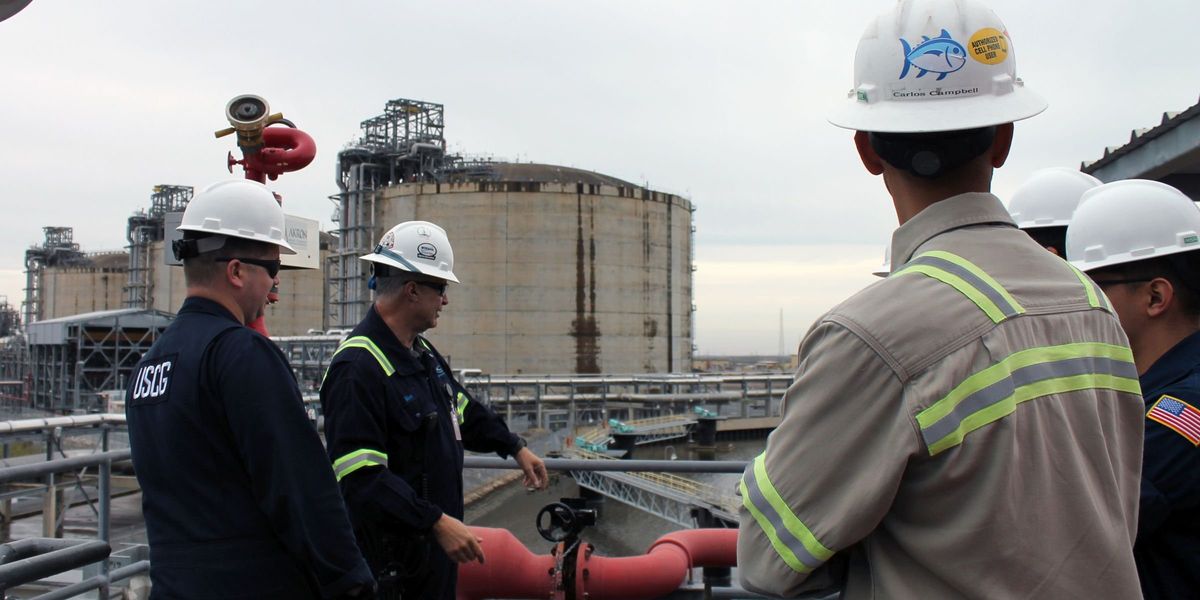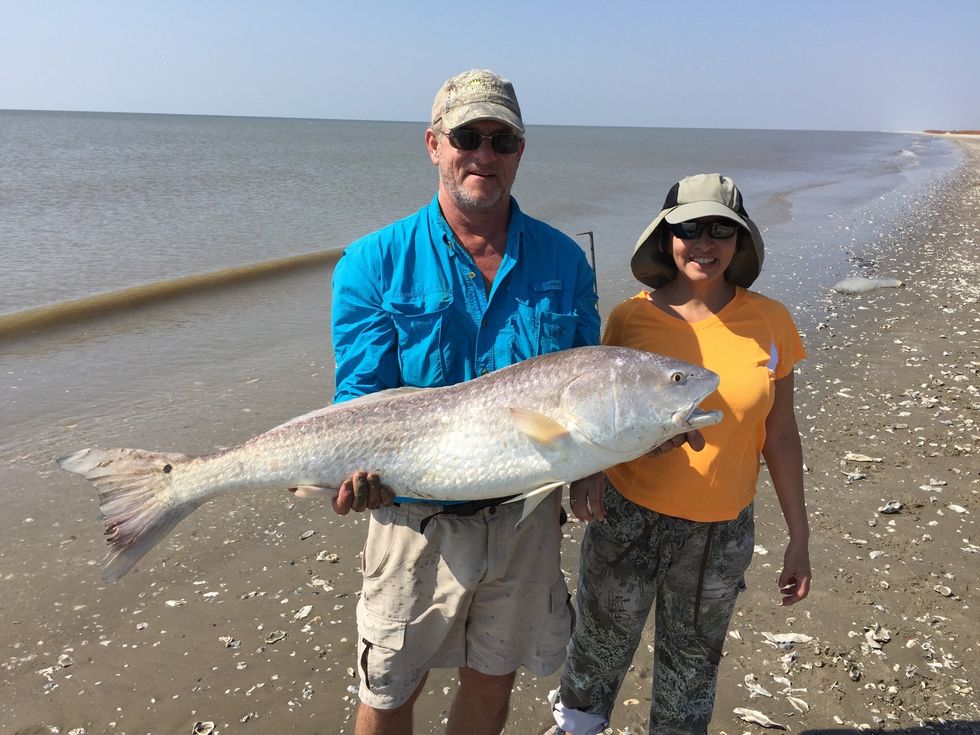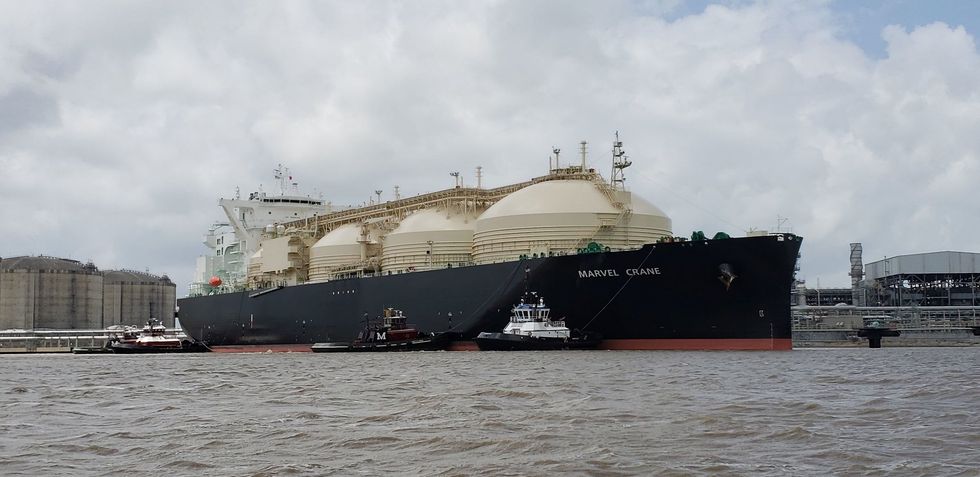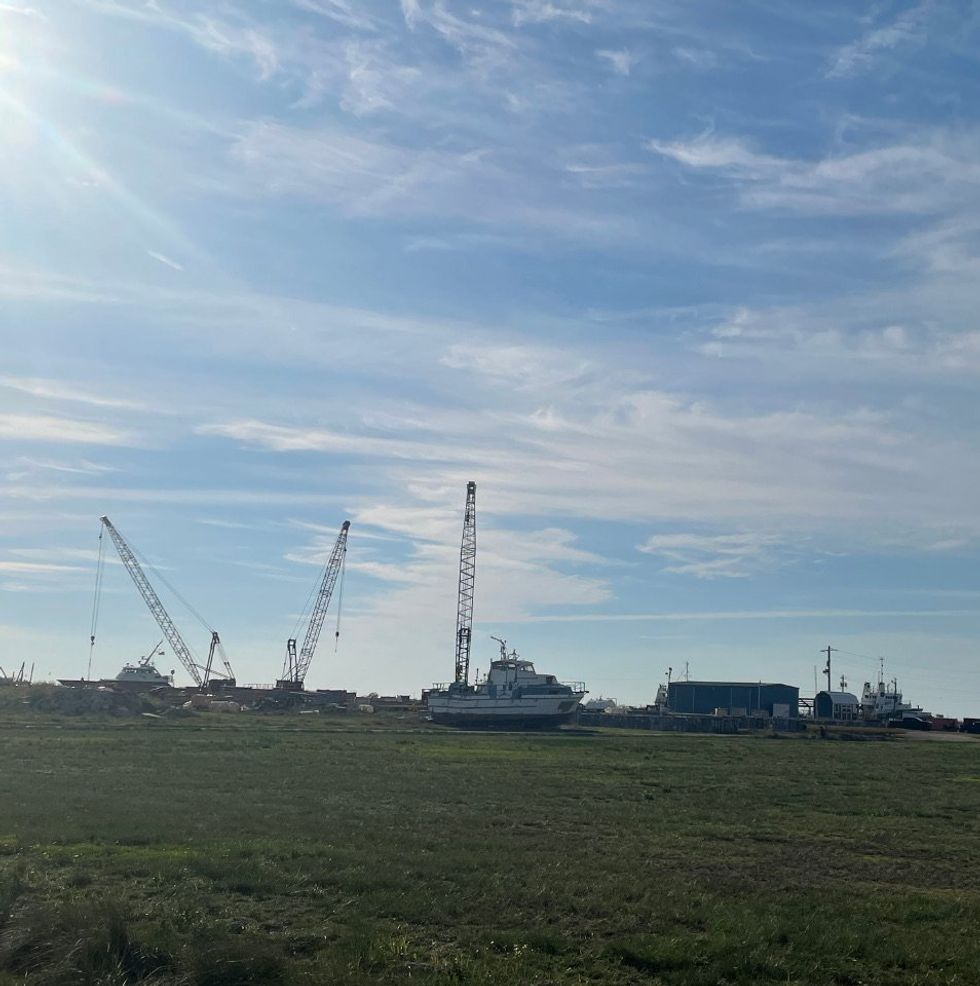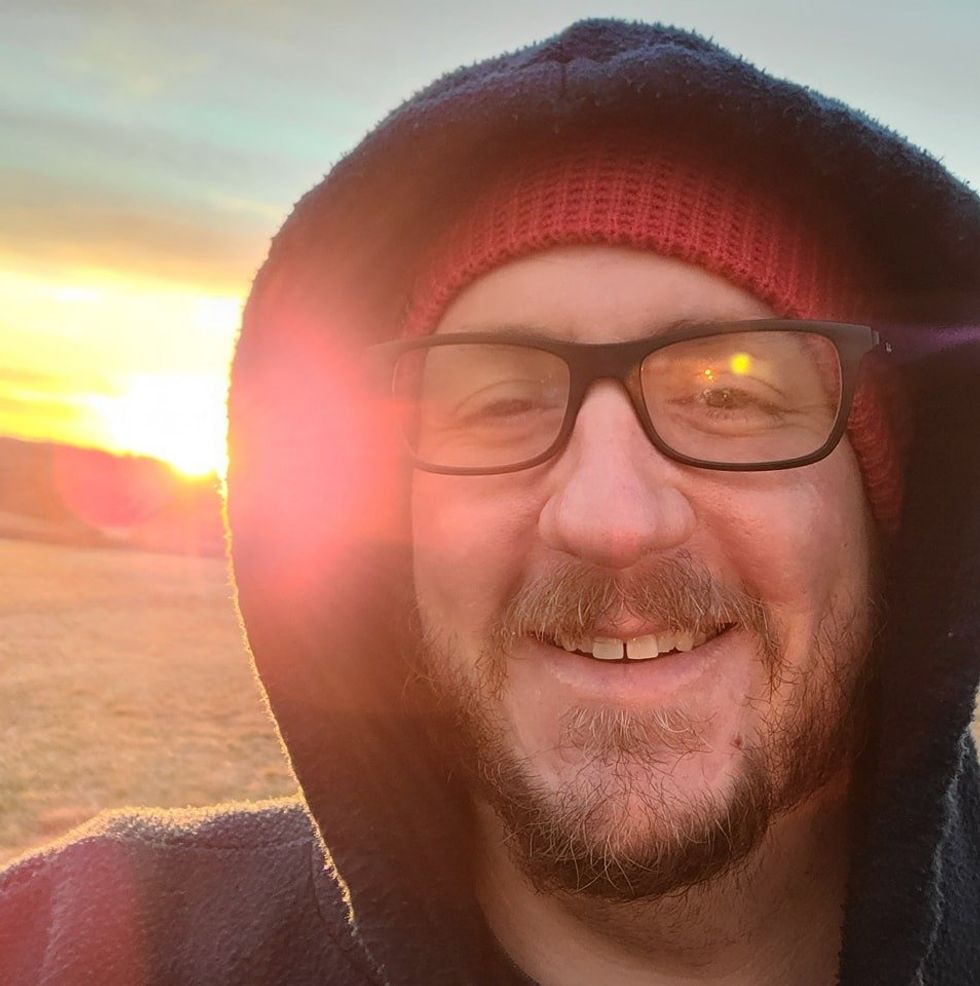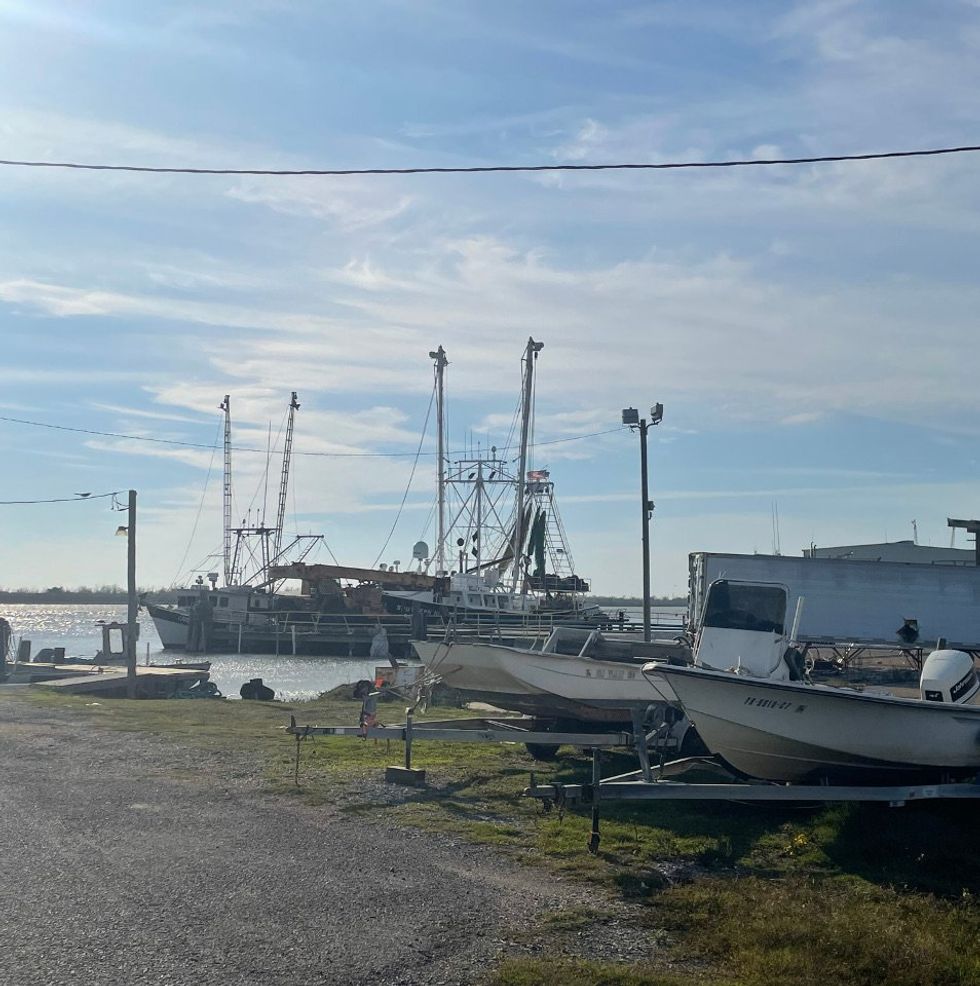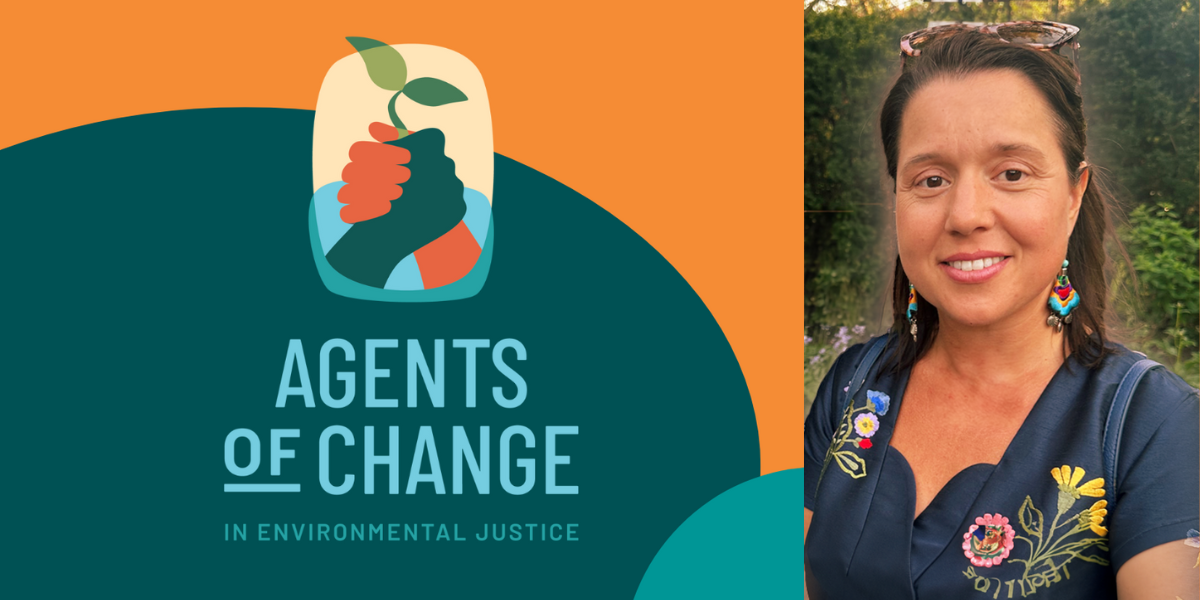
LISTEN: Ana Baptista on supporting environmental justice movement building in academia
“Some of the best relationships have been built over that time where you’re just getting to know each other, showing up, being present.”
Dr. Ana Baptista joins the Agents of Change in Environmental Justice podcast to discuss supporting environmental justice movements from within academia.
Baptista, an associate professor and co-director of the Tishman Environment and Design Center at the New School, also talks about how growing up in Newark shaped her environmental justice thinking, her role in the passage of the cumulative impacts bill in New Jersey, and how daily walks have bolstered her well-being.
The Agents of Change in Environmental Justice podcast is a biweekly podcast featuring the stories and big ideas from past and present fellows, as well as others in the field. You can see all of the past episodes here.
Listen below to our discussion with Baptista, and subscribe to the podcast at iTunes or Spotify.
And to learn more about Baptista's work please check out the following resources:
- Ironbound Community Corporation
- New Jersey Environmental Justice Alliance
- Environmental Justice Movement Fellowship
- Tishman Center's collaborative research
Transcript
Ami Zota
Hello, everyone. I'm Ami Zota, the founder and director of the Agents of Change in Environmental Justice program and I am very honored to have a very special guest today, a trailblazer in the environmental justice movement and also a longtime friend. And that is Dr. Ana Baptista, who is an associate professor at The New School. She also serves as the co-director of the Tishman Environment and Design Center at The New School. Welcome, Ana.
Ana Baptista
Thanks, Ami. So great to hear you.
Ami Zota
So, you know, we always like to kind of start our conversation, hearing a bit about our guest's origin stories. You know, hearing a bit about how it all, you know, how your journey started? Can you start off by maybe telling us a bit about your childhood and how you got interested in environmental justice?
Ana Baptista
Sure, yeah. Um, I think like many folks that work in environmental justice, the work of EJ started before we knew that word even existed or the movement existed for that. Because we, you know, a lot of folks grew up in communities impacted by lots of different sources of pollution or industries. Yeah, my family immigrated to Newark, from Portugal, we were immigrants there in the 80s. And we lived in a very industrial neighborhood with a lot of factories and industries and in particular a garbage incinerator, that was part of a very big community organizing effort to fight off. And I was a young teen, when the neighborhood was galvanizing and organizing around that. And there was a community-based organization, Ironbound Community Corporation, who organized my family and I into participating in a lot of the community meetings and community protests. And, and I would often go and translate for my family at those meetings, which I probably did really poorly. I don't know what I was translating half the time, but, um, but it was eye opening for me as a young person, because I just took for granted that you know, the smells that we smelled and the you know, the sort of the things that were just everyday normal parts of life, didn't seem odd to me until really starting to organize with the community and seeing my neighbors and you know, folks really coming out to protect the community, you know, and that was really powerful because it made me feel like you know, our home is really valuable, like our... this is our... this is a place that we treasure and it's part of our community. And we didn't think of it as a place that was you know, dirty or a dump site. We thought of it as our home. And so, seeing everyone come together and really fight to protect our community was you know, it felt really empowering and felt really good. I Love Newark. I love the city of Newark. I loved growing up there. I love my neighborhood. And I didn't actually realize people, you know, thought otherwise until I left Newark. And I heard how people talked about the city in a very denigrating way. And so I was, you know, I grew up in that, in that time when people really, you know, came together and organized and continued that tradition. I mean, that's a long tradition in the city of Newark, and many cities that are environmental justice communities, where residents really, you know, formed a lot of resistance and built homes and communities very rich. And it's wonderful to see that that tradition has been continued in the Ironbound Community in Newark, but many other communities that I've been able to visit and be in community with. So yeah, it was, it was an interesting way to grow up, because I didn't know there was an environmental justice movement at the time, but it made me really passionate and wanting to fight. You know, I really wanted to come back home, that was always my goal: is to come back home, and try to fight for my community, fight for my neighborhood to stop the dumping in the neighborhood, but also to make it a place that was healthy, unsafe, for, you know, the next generation and my own family that was still there.
Ami Zota
Thank you for that. I have so many follow-up questions. But before we dive further in, you know, kind of another question that we often ask our guest is, and maybe maybe this is that experience, but what what is, uh, can you share with us a defining moment or a defining experience that has shaped your identity?
Ana Baptista
A defining moment? Gee, that's a tough, deep question, Ami! Oh, gosh, um, you know, I written about this, this moment, because it did stick with me. I was able to go to a program as a teenager for environmental studies, it was a summer intensive program. And it was very selective. You know, they selected you know, kids throughout New Jersey, that were, you know, interested in the environment to go spend the summer at a university and learn about the environment. And I felt very lucky to be part of that selection of those cohort of young people, we were mostly juniors and seniors, about to go to college. And one of the field, they did many field trips, to the Pine Barrens, and to all these different ecosystems, really great program. And one of the trips was an environmental justice tour to Newark, to my neighborhood, to my community, with some of the organizers from Ironbound that I knew. And on the way there, before, we met up with the Ironbound organizers. It felt very, like people, kids didn't know who I was, they didn't know that was my community. And so I was really nervous that I was like, "oh, no, these kids are really wealthy, suburban kids, you know, they're going to come visit my home and look at it, like some tragedy. You know, like, like a zoo," you know, almost like, so I was very, very nervous about that. And I remember, on the bus ride up to Newark, from South Jersey, I kept thinking, "Am I going to tell these people that they're visiting my home? Or am I going to be quiet and just let them observe?" So it was, but I had it in me that I was like, "No, I have to say something I have to..." you know, I got up the courage to be like, before you all start gawking at Newark, like it's some terrible experiment. I started telling them about all the protests and all the organizing all the efforts that the neighborhood residents had really fought for, and telling them about the great things about the community too, like, you know, we have these wonderful, rich diversity in our neighborhoods, we have all this wonderful cultural history. So that, you know, they got not just the toxics, but the treasures part of the tour. You know, it calms my nerves, and it made me realize that and telling my own story and sharing that where I was from, it was also a way for them to connect with me and connect with the place in a different way. But it was definitely a long bus ride up to Newark before I decided that I was gonna say something to all these people that I you know, didn't really know very well. So yeah, that was definitely a moment that I remember. Knowing what I know of you. I can't imagine you being silent. A moment I was like, 17 and I was trying to be cool you know, on the bus. Yeah, fit in, you want to fit in, all this kind of stuff. Right? Exactly.
Ami Zota
So you've already mentioned, you know, a couple of references to Ironbound Community Corporation. And you know, knowing what I know of you, I know that has been a big part of your contributions, your journey, your identity. Can you tell our audience a bit about that org, their mission, the ways in which you have worked with them. And you know, maybe some of the work that you've done that you're particularly proud of?
Ana Baptista
Yeah, I mean, it's an amazing organization, one that I definitely credit with giving me my real education, you know, you go to school for one type of education. But growing up in the Ironbound, and being a part of the Arman Community Corporation was a wake up call my real, my real PhD, that's where I got. The organization was founded in 1969, by a group of mothers looking for alternatives for child care, at a very turbulent time in the city of Newark, right at the time of the rebellions. And the Ironbound Community in particular is a neighborhood in the East ward of Newark that had historically been, you know, an ethnic enclave for many different types of ethnic groups, and also African American and Puerto Rican, lots of Latinx communities over the years and continues to be that type of place type of community and ICC formed first with a mission to provide educational alternatives and also support women, working women, in the community. And it was founded by residents. So it's always been resident-led, and has a strong community-based social justice focus. And it wasn't until probably the 70s and 80s when there was in you know, it's always been an industrial neighborhood, you know, since the 1800s, it's had been cheek-in-jowl with industries. And those industries started to really abandon the City of Newark, like many cities throughout the US. And what they left in the wake of that was a lot of, you know, contamination, explosions, you know, worker safety issues, neighborhoods that were facing a lot of contamination. And so that Ironbound Community Corporation really developed a whole other leg of the operation that wasn't necessarily about education, or early education, but was about organizing, and social justice, and fighting a lot of new proposals for pollution, right? because the community was constantly a target of industry, and continues to be that, actually. So they also, the Ironman committee Corporation also does a lot of wonderful community development, or, you know, a lot of community building. So it's not just about fighting things, it's are all about building things. That's what I love about the organization. And I continue to be on the Board of Trustees, and I worked for them for a decade that sort of, say, got my education there, because I got a doctorate degree, but then I spent a decade after getting my Ph.D. really working in the community because I wanted to, you know, really take all the things that I had learned and apply them in my own community. And in doing that, it was a tremendous education for me, because I learned from the residents and the elders, what it really takes to make change, you know, the nitty-gritty, everyday, not-sexy stuff, not theoretical, you know, the real life, bread and butter of hashing it out, you know, fighting the good fights. So I'm very proud of that work, because it was tough. It's so hard. And I'm so proud of the the people that are, you know, doing that work now at the Ironbound Community Corporation, the organizers and leaders there that are national leaders, you know, they took Ironbound Community, really, to a national scale that I never even imagined. So I'm so proud of that legacy continuing and spreading and deepening those ties. But yeah, it continues to be a wonderful place at home for me.
Ami Zota
That's wonderful. And I'm so glad that you're still so connected to them. So correct me if I'm wrong. So you you you did your formal education training at Rutgers, I believe, right?
Ana Baptista
Yeah.
Ami Zota
Did you and I don't I don't know did you work at Ironbound while you were you were doing your doctorate?
Ana Baptista
Funny story: inadvertenly, because I was living at home, you know, I came home and live with my parents, while I did my doctorate at Rutgers. And I would just get sucked into things, you know, because I'm home so people know, I'm home, like, "Anna, can you help us with this community planning project?" or "we're going to do this," you know. So I was volunteering, and then volunteer was being voluntold. And, and then I started working part time, you know, theere, just like to help out on projects. And I loved it. I loved working there. I love the people there. And I had this, I also finished my doctorate when I was like, eight months pregnant. And I must have been the hormones because I was like, "I don't want to be an academic, I want to be an activist!" And so yeah, I, um, they offered me to come work full time with them. And I said, Yeah, this is what I want to do this where my heart is calling me. So yeah, I was working part time there while I was teaching I taught, I was teaching at Columbia, taught at New School. And I decided that was that was the place for me. Yeah.
Ami Zota
And so now you've, I mean, you have found a way to continue your scholar, you know, your scholar-activist work. But you're rooted now again in academia. So can you talk a little bit about what that transition was like? And then maybe a little bit about kind of what you do these days? I know, it's a lot to the extent that you can even begin to describe it. But what your focus is at the new school?
Ana Baptista
Yeah, I mean, I, I was teaching as an adjunct at the New School while I worked at Ironbound and I love The New School because of sort of a quirky place, right? You know, the students were very aware and critical. It was a place that appreciated practitioners, like people who were in the field doing the work, not just theoreticians, although it had a strong focus on both, which I liked a lot. And you just never know in life, what door's gonna open for you, right? aMI, I'm sure you can appreciate this in your own trajectory in your own career. You know, I didn't imagine I'd end up in academia ever, but I had an old friend who became the dean of The New School. This is a person that I came one of my greatest mentors, Michelle DePass, who worked at the New Jersey Department of Environmental Protection at the time that I was a graduate student –an annoying one at that, because I kept bothering her. She was the first environmental justice officer in the department. And I would knock on her door and demand things constantly for the Ironbound. And, to her credit, she never sent me away. She was very committed to environmental justice, having done that work herself in New York City for many years. And she went on to work in the Obama administration. And then came back to New York to be the dean at The New School and said, "Oh, there's this job, you should apply. You're an adjunct already." And I said, "I am not an academic." And she's like, "No, no, it's a, an open-rank position. And we hire professors of practice, too. So why don't you give it a try?" And, you know, I did. And she also, Michelle DePass, was also the person who really relaunched the Tishman Environment and Design Center were just another home for me now at The New School. And her vision was really one that I believed in and shared and hope that I'm honoring, which is that she wanted to make the center a home for doing real collaborative work with the environmental justice movement. You know, she wanted to create a center that as a activist and as an advocate in the EJ movement I had wanted to work with, right? like, you know, where are those partners, those trusted people that you could count on in difficult times to work with you. And so she wanted to create that kind of center. And I was like, "I'm down for that. Let's do it!" So she brought me into that, that work very, very generously and lovingly and mentored me about how you do those sorts of, you know, sort of very delicate balance of, you know, you're in academia or in an institution of higher education with all of the different institutional structures that that comes with, but also opportunities, you know, she's like, think of this as an opportunity to invest in the next generation of scholar-activists and activists and advocates but also with an opportunity to leverage of the resources of higher education and muster that in the service of, in service to, an accompaniment with movement partners. And what a wonderful opportunity. So it for me, it was like a dream job really to be able to saddle those two worlds and learn how to do that. And I'm still learning. We're all still in learning process for sure. And so a lot of my work now is focused on, you know, deepening that work. And I would say, scaling it. You know, my, my vision for the center was pretty modest. It was like, "Can we create a little home, a hub, for working with the movement?" and, you know, little by little, we became a place that was able to really scale and build an infrastructure to touch movement partners, and work and collaborate alongside partners across the US, with movement leaders, building the Environmental Justice Leadership Fellowship program that we we have now, and also doing really wonderful research, you know, participatory research with movement partners, to help make change, right? like to help move that the needle. So yeah, that's most of my time now is really continuing to, you know, do the best we can to leverage the resources of higher ed to the benefit and accompaniment of the movement.
Ami Zota
Can you can you elaborate a little bit more on the Movement Building fellowship that you've helped to start? I think it's such a neat model and pretty unique.
Ana Baptista
Yeah, it's, it's a something that I again, I didn't envision doing. It wasn't in my initial, you know, ideas of things we would do. But it was an opportunity that came to us, right? there was a funder who wanted to invest in higher ed, in a center in higher ed. And, you know, I think their initial idea that they were scoping out was to do something like a master certificate or something. And I said, well, with my partner, my, my co-conspirators, Sujatha Jesudason, she was a professor, a colleague of mine, we were like, "well, you know, there's the movement really need a master's certificate? I don't know. Like, let's ask them what they think, what they want." So we embarked on this journey of asking a lot of movement leaders, we probably surveyed or interviewed over 150 EJ leaders around the country, which in and of itself was such a privilege to do. And we did this whole landscape of, you know, what's out there for movement partners, and what's needed to really help unlock the power of the movement and help support them. There are lots of leadership programs, there's a lot of fellowship programs. And so we didn't want to sort of bring sand to the beach. Right, you know, and it was a, you know, back in 2019, 2018. It was like, what's the political moment? What's the opportunity? What, what is the need? There was a lot of feedback from movement leaders about having the space to take risks together, to be able to think creatively in very disruptive ways about the kind of work that they want to do. And when you're in movement leadership positions, that's hard to do, right? Because you're busy running your own organization, and building coalitions and executing strategy. You may not have the luxury of finding new partnerships and collaborations and being able to scale those or think differently or creatively about them, right. So the fellowship was conceived of as an opportunity to take advantage of the rightness of the movement for disruption, for innovation, for collaboration, right? So unlike lots of other fellowships, leaders in the movement self-select a group of people they want to work with. Come in maybe in group a group of two or three, sometimes four movement leaders with a problem in mind that they've been tackling, maybe individually, sometimes together. But the fellowship gives them two years, and funding and support for themselves and their organization. And then for their group to prototype –we call it prototyping. So really using a design mindset– to prototype ideas and try them out, and then try to scale them together. And so we launched the pilot and we launched the pilot two years ago, we we just finished our first cohort and we really co-designed with an initial inaugural cohort of leaders around the country, we were lucky enough to have their input into the design of the curriculum for the fellowship, and now we're going to launch 2.0. this spring. So we're very excited about that. And we have sort of a 10-year vision, right, you know, 10 years of investment in movement building, infrastructure, that leadership infrastructure, folks that will have to design mindsets, disruptive mindsets, that can have the tools and the cohorts to move the movement. I have so many questions. I mean, what one I just have is, Are there ways that you're going to be showcasing the work and the prototypes that come out of the fellowship? Yeah, the first cohort's prototypes and projects are online now. So the reporting out all the evaluation and learning from and the results of that work are now on our movement fellowship website, and it's been coming out in different ways. We're sort of also on this journey of like, how do you released some of the work, what worked, what didn't work. And also the work that the fellows started is continuing. So it's not like it is a discrete project that ends at the end of the fellowship, they continue their collaborations. So, you know, for example, one of the groups was a group of women from the Mariana Islands. And they leaders from that, that sector, one was a representative from Taipan and a US Representative from Taipen, and the head of the Micronesian climate just change Alliance. So folks, those those women created a cultural healing walk, they went to all all the islands in the Marianas to create this sort of movement. They hosted a Pacific Climate Summit, which we helped to support and were a part of, and did a Pacific Climate Declaration. So all that work is was built during the fellowship, and now it's continuing post fellowship. So yeah, there's really some exciting work. And many of the fellows have gone on to use the fellowship to also capitalize on the federal investments that are coming out of the IRA. So several of them have partnered and become grantees, through the EPA striving communities grant program process, grant makers process. So yeah, it's amazing to see some of the work they've been able to leverage.
Ami Zota
I love that. And so if if people want to learn more, they can go to the Tishman...
Ana Baptista
Tishman.org website. Yeah, okay.
Ami Zota
Yeah. So I want to keep I want to keep the conversation moving. I feel like I could talk to you for you know, for a long time, but I want to make sure we have some time to talk about the cumulative impacts bill that was passed in New Jersey, which was really the first of its kind in the nation, and was considered a big policy win for the EJ movement. Can you share with us how you were involved and a bit, you know, you know, kind of talk about the behind the scenes of what went into getting this monumental bill passed?
Ana Baptista
Yeah, I was part of a very close knit group of New Jersey environmental justice leaders and I played a small role in that group, but but we've been working together on environmental justice issues in New Jersey for over a decade or more. And so we have a close alliance of environmental justice organizations in New Jersey that are used to working together in good times and bad. And so it includes organizers and leaders from the Ironbound Community Corporation, so María óLpez Nuñez, Dr. Nikki Sheets. We had the New Jersey Environmental Justice Alliance, Melissa Milles. We had folks from the clean water, Clean Water Action in the South Ward Environmental Alliance in Newark, Kim Gaddy. So we formed sort of a tight partnership. We also had support from Earth Justice, who supported us with legal advice along the way. But as a group as a collective, we've been working on an environmental justice bill for over a decade, right? probably 12, 13 years through different administrations. We also – this same group helped to pass an environmental justice ordinance in the city of Newark in 2016. And so for a while when we didn't have a political opportunity window at the state level, we focus at the municipal level, trying to pass municipal-level ordinances tied to land use redevelopment processes. So that was one route we took. And then as the political tides turned, we, as a coalition, saw the opening to do a state bill that was really strong, coming out of interestingly, in the middle of COVID, but it was during the protests around George Floyd, and Black Lives Matters, the height of the Black Lives Matter movement, and we had many politicians throughout the state claiming that they were for racial justice. So in that, in that context, there was a bill proposed by a state senator, Troy Singleton, focused on environmental justice that we were surprised about, we didn't we didn't know Senator Singleton. He developed the bill on his own, really on the basis of a bill that Senator, US Senator Cory Booker had developed. And we had been working with Senator Booker, Representative McEachin. And Senator Rojalva. In the federal at the federal level on an EJ bill for many years, and New Jersey, folks, like Nicky Sheets, were very involved in the crafting of those federal bills that, unfortunately, never really moved anywhere, but were important in terms of setting the stage for bills and what bills could include on environmental justice. So, we met with Senator Troy Singleton, and he was the real deal. I mean, he really was committed to doing a strong environmental justice bill, and was willing to work really closely with us as experts, as subject matter experts on what that bill should contain, which was really important. We met with his staff and him and tried to structure a bill that was not just procedural in the sense of like, "oh, let's study this problem. Let's map out all the impacts the communities face." No, we wanted a bill that said, "communities can say no on the basis of cumulative impacts," because that has really been the ultimate goal for many communities – is having a way to interrupt the normal flow, business-as-usual model. And for years, the state regulators told us very frankly, that they did not believe they have the authority, the legal authority, to deny permits particularly on the basis of cumulative impacts. We had, we actually had the head regulator, or the head of the department tell us straight up, "That's never going to happen. We don't know how to do cumulative impacts." Two years later, that same agency was writing rules for the bill. So the bill, what was unique and special about it, is that it is one of the only bills –and now New York State has a similar bill, but it's New Jersey's the only one that has the rule that accompanies the bill– that says to industries: these are the types of facilities mostly industrial, large scale, air permits, waste permits, that are subject to review. If you're in a community that's low, well, people of color, linguistically isolated, you have to do this review. And if your community has the stressors that are above the average, then we must deny the permit for an additional facility that would add or contribute to those stressors. And it doesn't say shall it doesn't say may, it says must
Ami Zota
Wow.
Ana Baptista
It is requires a denial on those grounds. And it also applies to renewals of permits, but it doesn't require a denial. The renewal process allows for conditioning of permits to try to ratchet down collusion, where those contributions exist. So it's a real game changer in terms of the power that now communities have and the regulator's are now empowered, they can no longer say they don't have the legal authority. They now have the legal authority and the tools to deny permits, to condition permits, to go further than they've ever gone in terms of protecting communities that are already overburdened. So it was a huge victory, but it was one that came after many decades of incubation. And you know, knowing and being ready to take advantage of the political opportunity and building coalitions, you know, the ability to organize and get support for this kind of bill required coalition building mostly with social justice organizations, more so than even environmental organizations, because the social justice organizations really understood and represented the communities that were overburdened in different ways. So that was really important to have been able to gain the political support for this kind of a bill.
Ami Zota
And where are things with implementation of the bill?
Ana Baptista
The rule came out, it was finalized after two long years of rule making. It was finalized in April last year. And the rule is now you know, going into effect. So there's several permits that will come under review under this, I think there's a whole slate of permits that are now going to be subject to the rule. So it's going to get tested, field tested. In the meantime, there are two industry groups that are suing to try to, to lock the bill. And we knew that right? Anytime you pass a really strong bill like this, you will get and you should anticipate getting industry opposition to the bill. So that will work its way through the courts, you know, in our coalition to supporting the DPS defense of the bill. But yeah, it's
Ami Zota
Is it going to the state Supreme Court?
Ana Baptista
Um, we're not sure yet how, you know, it's, it's being considered now. So we filed an amicus briefs in support of the DEP and the rule. So we'll see if the, the how the courts treat the merits of the, of the, of the contestation over the bill. So yeah, but, you know, we, we worked really hard to with the regulators, and with our own legal support, to try to strengthen the bill, and the public record for the bill and the legal basis for the bill. So we did not, you know, it was one of the few times in my life and my career, that we worked really closely with regulators to develop the technical substance and the legal substance of this bill. Similar to what industries do, like the industries do this all the time, right?they, they develop model bills, and then they work very closely with lawmakers to get their bills through. We don't do that as often, we're often in an antagonistic position with the state. And in this case, we were able to work very closely to develop a bill that we can stand behind and defend just as much as they can.
Ami Zota
So many lessons, you know, lessons learned there about being prepared, being organized, you know, being savvy on many different levels. I know, I feel like we're in a moment right now, where government, you know, action is being strongly critiqued? I believe the the new EPA regulations, the low, you know, the lower limits on PM2.5. That just got passed, already heading to the Supreme Court.
Ana Baptista
Yeah.
Ami Zota
So but I hope that this is, this will was will play out differently, and I'm looking forward to staying in touch to hear about it. So we're all we're really kind of rounding, you know, whatever we would say like, kind of, I'm closing up here. And I just have like, one, like, last question. And I think it also has to kind of relate to the conference, the amazing energetic conference that you just organized, around, you know, centering justice, and really helping to help facilitate authentic, meaningful relationships between academic researchers and grassroots groups, to do this work, to do the movement building work. And as you may know, the Agents of Change program is really about supporting and lifting up emerging scholar-activists, you know, all of whom are from deeply-impacted communities and are really to what I see is the future of environmental and climate justice, particularly, you know, folks who have already demonstrated and want to really be in allyship with movements. And as you know, and they're all early-career folks, so right doctoral students, postdocs, some some who are in government. And, and it's it's really, really hard to walk that walk right? On so many levels you often get conflicting pressures, conflicting advice it can, it can it can be exhausting, but important work. So, I mean, do you have any you know, from kind of the mid-career perspective, any any parting advice or perspective, you know, to offer them as well as you know, others that are in a in a like-minded place?
Ana Baptista
Yeah, I mean, what a wonderful, what a wonderful thing you're doing Ami. I think it's very important work to, to really nurture, right? and feed that soil, you know, the those early-career folks, because like you said, it is hard, it's hard for the activists in the movement. And it's also hard for those who've, you know, chosen to be in different positions – in allyship and scholar-activism, and they're trying to figure out how to navigate these very, very complex pressures and demands and also trying to follow their heart and their conscience right now want to be in right relationship. And it's not always easy to know how to do that, or where to go to do that. It's not obvious. So I mean, I don't know if I have advice as much as like, you know, keep trying. Most showing up sometimes is half the battle, like I say this all the time is like, being present. And being in relationship with people means there's not, there's maybe no money, there's no project, there's no special occasion, it's that you're committed to, you know, those people or that community or, you know, the, the place. And so you keep showing up, and you show up in ways that like, you know, hey, do you need me to pitch in here or, you know, do you know, it's, it's a, and you don't know, when you're needed, unless you're around enough to know, when you might be called up to do something. So it requires, yeah, being present in though in ways that are not as obvious in, like, spelled out, right. Like, I was, like, I just had a work plan for how you build those relationships. And then like using your, you know... I found that some of the best relationships have been built over that time, where you're just getting to know each other, you're showing up, you're being present, but you're also like, you have all this informal knowledge and informal, you know, we occupy all these spaces that have networks and ecosystems that are invisible, and we're often doing a lot of invisible work. And lean into that. That's okay. Sometimes I would feel nervous sometimes, like, oh, doing all these hours of reading permit comments, and no one's ever going to see this, like, Is this even worth it? like, but sometimes I'm leaning into that work. And if you feel it's meaningful, if you feel like it's moving, advancing and helping out in some way, then you can continue to do that work and you know, not take it for granted that you have some, you know, some talents and skills to to give in that space that you may not even recognize you have. Little things. Like I you know, sometimes I just write people let but write letters for people I here, I just saved you two hours of your life. I took me two minutes to do. But yeah, so I would say that and listen a lot, you know, because part of being in those spaces is also listening and learning and yeah, lead with your heart there and leaning lean into it into those spaces that feel like, you know, spaces where you can make a contribution and build long-term relationships over time.
Ami Zota
Yeah, the value of long-term relationships. It's, you know, it's it's really what underpins so much of this work. I mean, right? you and I met almost 20 years ago
Ana Baptista
Can you imagine? Oh, my gosh.
Ami Zota
It's wild, right? But I am gonna let you go. And my last question for you is, you give so much and you do so much so what are you doing these days to recharge?
Ana Baptista
Honestly, during COVID Um, I was really burned out going into COVID I was doing too much like many of us, and I started walking every day outside –no matter what the weather, rain, shine, snow. And that is, it really helped me recenter, refocus, also get healthier, because I was really burnt out spending a lot of time in front of a computer. And so just being outside, you know, at least an hour a day, really is something that I have to do. Like now I feel like if I don't do it, I don't feel well. So yes, I encourage everyone to find that little – and I feel guilty about it. I'm like, as I'm walking, sometimes I'm taking calls and doing zooms. I'll admit that– And I feel guilty because I'm like, "God, this is a big chunk of my day that I could be, you know, productive," but being outside and, you know, just moving like, a body in motion stays in motion. Having that ability to move, helps you move your mind, helps you connect. So yeah, I would say that's the one thing I'm going to keep doing and I hope you all do it too.
Ami Zota
Yes. A colleague and who's also been on here, Diana Hernandez. She's a big fan of the walk and talks. Yes, building relationships while getting your time and moving. So there are ways to we can combine all of this right?
Ana Baptista
Yeah, we imprint we imprint differently when we're walking and doing that.
Ami Zota
All right. Well, I am going to close this out. This has been such a wonderful conversation, so many gems of wisdom and experience and insight.
Ana Baptista
It's very sweet, Ami. It's very sweet of you to invite me on here. And it was it was really my privilege and honor to be able to spend this time with you.
Ami Zota
Yeah, I mean, we were all about Amplifying Voices and you have one that is so worth amplifying. And you know, looking forward to continuing to be in collaboration with you and all that you do.
Ana Baptista
Let's do our walk and talk, let's do it!



